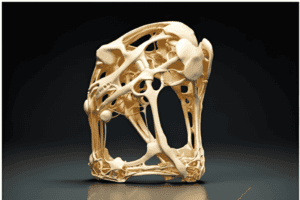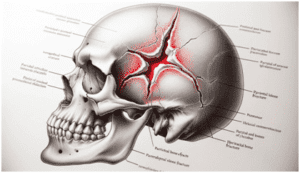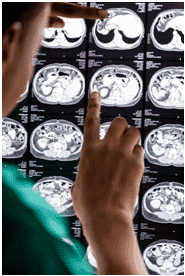Did you know that the parietal bone protects the brain and supports the structure of the skull?
Read further to know all about Parietal Bone and its implications in Head Injuries & Fracture Treatment Implications.

It is a crucial part of the human skull, located near the top and sides of the head, i.e. in front of the occipital bone and behind the frontal bone. The parietal bones also help to shape the head and are a part of the skull base and cap.
For any neurosurgical concerns, book an appointment with Dr. Gurneet Singh Sawhney, a renowned neurosurgeon in Mumbai, specializing in brain-related treatments.
Do you know that nearly 40% of skull fractures are parietal bone fractures?
“Hence, it is essential to know all about parietal bone fractures and their impact on head injuries“
Understanding Parietal Bone Fractures and Injuries

In instances of severe parietal bone fractures, there may be bleeding and the potential for associated complications, including brain damage.
In cases of a parietal bone fracture, the affected area is typically indicated by a red mark.
“Know more about the causes and symptoms displayed on account of parietal bone fracture“
For expert evaluation and treatment of parietal bone fractures, consult Dr. Gurneet, Mumbai’s leading neurosurgeon. Schedule your appointment today.
Causes and Symptoms of Parietal Bone Fractures
Parietal bone fractures can result from various traumatic incidents, such as falls, accidents, or sports injuries. The force of impact and the location of the break determines the severity of the fracture. Recognizing the symptoms is vital for prompt diagnosis and treatment.
Common symptoms of parietal bone fractures include:

- Severe headaches
- Swelling and tenderness in the affected area
- Bruising or visible deformities
- Nausea and vomiting
- Changes in mood or behavior
A medical check-up is necessary even if the patient does not display any symptoms immediately after the injury. In case of injury to the underlying brain tissue, the patient will have difficulty remembering, concentrating, paying attention, making a judgment or problem-solving.
Hence, it is vital to seek medical attention immediately to assess the extent of injury, even if the patient does not complain of any of these symptoms.
“Are you seeking a diagnosis for parietal bone fractures? Contact the expert team at Neurolife today for comprehensive evaluation and guidance“
Diagnosis of Parietal Bone Fractures

In case of a suspected parietal bone fracture, the doctor will recommend the following imaging tests viz.
X-ray or a CT Scan both deliver detailed images of the brain and the skull and hence are reliable imaging tests to find out the extent of head injuries. The doctor will check whether the patient has suffered from a right parietal bone fracture or left parietal bone fracture.

It is advisable to consult a neurosurgeon for a detailed examination if there is a severe parietal bone fracture along with bleeding, brain damage, or other complications.
“Now let us read about the brain surgeries performed to treat parietal bone fractures“
Brain surgeries and procedures for more severe or complex parietal bone fractures
Dr. Gurneet Singh Sawhney, a leading expert neurosurgeon in Mumbai, India, is committed to providing the most suitable treatment for parietal bone fractures. He states, ‘Delay in parietal bone fractures has to be avoided at all costs. The main line of treatment is surgery to remove the depressed bone piece, repair the underlying brain tissue, and prevent complications such as bleeding and infection.’
Surgical options for more severe or complex parietal bone fractures include:
Elevation and debridement
One of the most preferred surgical procedures to treat parietal bone fractures. The neurosurgeon removes the depressed bone fragments, cleans the area, and replaces the bone fragments, if possible, through an incision in the scalp.
Procedure of Elevation and debridement
- The neurosurgeon makes an incision in the scalp over the fracture site.
- They proceed to remove the depressed bone fragments using highly specialized instruments.
- They then clean the area and replace the bone fragments as much as possible.
- The neurosurgeon will close the incision with sutures or staples.
3D render of a neurosurgeon at work, with a detailed view of the parietal brain area being elevated and debrided, highlighting the elevation and debridement procedure.
Cranioplasty
This neurosurgeon will repair skull defects that are too large or complex and cannot be repaired with elevation and debridement. The surgeon will use a bone graft or synthetic material to fill in the defect if required.
Procedure of Cranioplasty
- The neurosurgeon makes an incision in the scalp over the skull defect.
- They will remove any damaged or infected bone tissue.
- They then place a bone graft or synthetic material over the defect to fill it in.
- The neurosurgeon will close the incision with sutures or staples.
Decompressive craniectomy
The neurosurgeon attempts to reduce the intracranial pressure on patients with severe parietal bone fractures. They remove a part of the skull to relieve the brain pressure
The procedure of Decompressive Craniectomy:
- The neurosurgeon makes an incision in the scalp over the fracture site.
- The neurosurgeon will use a saw to remove a portion of the skull bone.
- They will then cover the exposed brain with a membrane or flap of skin.
- The neurosurgeon will close the incision with sutures or staples.
Potential risks of surgeries to treat parietal bone fractures:
Like any other surgeries, risks associated with surgeries to treat parietal bone fractures are as follows –
- Infection
- Bleeding
- Blood clots
- Seizures
- Damage to the brain or nerves
- Anesthesia risks
Dr. Gurneet Singh Sawhney, a leading neurosurgeon, offers to perform all the latest types of Brain Surgery in Mumbai, helping patients to recover from head injuries and other debilitating neurological problems.
“Head Injuries need immediate medical attention and timely intervention. Please approach an expert neurosurgeon to ensure the right parietal bone fracture or injury treatment“
Consult with Our Experienced Surgeons for Positive Outcomes After Parietal Bone Fracture Surgeries!
Outcome of Parietal Bone Fracture Surgeries
Generally, the outcome of parietal bone fracture surgeries is good as most patients recover well and live normally within a few weeks or months of the surgery.
It is possible that some patients can face issues despite surgeries on account of the severity and location of the fracture or additional head injuries or the patient’s health condition along with their age. These patients could suffer from seizures, cognitive impairment, or difficulty with movement.
It is important to note that the information provided here is general and should not be taken as medical advice. If you are considering surgery for a parietal bone fracture, be sure to discuss the risks and benefits with your doctor.
Surgical intervention may be necessary in cases of more severe or complex parietal bone fractures. Our surgical options encompass craniotomies and other advanced procedures. Our team will discuss the potential risks and expected outcomes with you, ensuring the best possible care.
Learn about effective rehabilitation strategies and begin your path to healing after parietal bone fracture surgery. Contact Neurolife clinic today!
Recovery and Rehabilitation
The period of parietal bone fracture recovery is a critical period that may take many weeks or even months, depending upon the patient’s health and the severity of the injury.
Post-surgery, following the treating neurosurgeon’s instructions, is very necessary and may include –
- Take ample rest
- Taking pain medication as recommended
- Avoid strenuous activity
- Consume a healthy and balanced diet
- Undergo physiotherapy sessions as recommended
On the recovery path
As a patient, you will be required to meet the neurosurgeon or the treating doctor for a follow-up session, enabling them to monitor your healing and progress. Only after these regular follow-up sessions can they give the patient permission to resume normal activities.
Some signs of healing include:
- The incision is closed and healing well.
- Decreased pain and swelling.
- Non-painful movement of the head and neck
- Can tolerate physical activity.
Please approach the doctor immediately if you experience any of the following symptoms
- Headaches
- Seizures
- Cognitive impairment
- Difficulty with movement
- Fatigue
- Depression
“Seek the help of an expert neurosurgeon who can help you to develop a treatment plan and manage your symptoms“
Key takeaways of parietal bone fracture and injuries
- Parietal bone fractures are the most common type of skull fracture and are caused by any impact to the head, such as a fall, car accident, or sports injury.
- The symptoms of parietal bone fractures can vary depending on the severity of the injury.
- Treatment for parietal bone fractures may include medication, surgery, or a combination of both.
- Recovery from a parietal bone fracture can take several weeks or months.
- It is important to carefully follow your doctor’s instructions during your recovery and seek regular follow-up care.
Why choose Neurolife Clinic?
At Neurolife Clinic in Mulund, we address any potential long-term effects and considerations related to these fractures. We also check out the recovery progress, monitor the healing, and offer relevant guidance to recover from the parietal bone injury. Our team will ensure you receive the best care during your recovery journey.
FAQ
Can a skull fracture heal naturally?
Minor skull fractures heal naturally, but major parietal bone fractures often require medical intervention due to their complexity and potential risks.
What is a parietal fracture?
A parietal fracture is a break or cracks in the parietal bone, one of the skull’s key protective elements, which protects the right and the left parietal lobes.
What causes a parietal fracture?
Various traumatic incidents, including falls, accidents, and sports injuries, are the likely causes of parietal fractures.
What is the parietal bone’s function?
The parietal bone forms the skull’s upper lateral wall. The function of the parietal bone is to protect the brain from and provide structural support.
Where is the parietal skull located?
The parietal skull is situated near the top and sides of the head and is a crucial part of the cranial structure.
Regarding parietal bone fracture treatment, our team of some of the best neurosurgeons in Mumbai is dedicated to ensuring you receive the best care possible. For more information or to schedule a consultation, contact us today.
